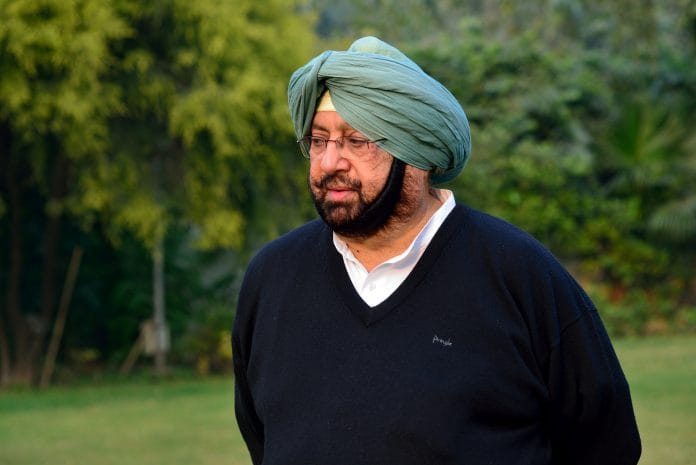There is a strong and widespread resistance to free speech across the political spectrum.
As India grapples with its ongoing reactionary wave of politics, Punjab Congress appears eager to ensure that it is not left behind. Earlier this week, the Punjab cabinet approved an amendment to the Indian Penal Code (IPC), which would insert a new provision (Section 295AA) into the statute. As per this new provision, “whoever causes injury, damage or sacrilege to Sri Guru Granth Sahib, Srimad Bhagwad Gita, Holy Quran and Holy Bible with the intention to hurt the religious feelings of the people, shall be punished with imprisonment for life”.
This development only confirms what is already widely known – there is no political party in India that is willing to take a firm position in support of civil rights, especially the right to free speech and expression. Across the board, whether one considers legal changes to specific acts like bans and prohibitions, no party has a record that is worthy of a column. The arguments in favour of limitations are familiar and tired – free speech was never meant to be absolute, individuals must learn to respect the feelings of others, the state exists to protect public sentiments, so on and so forth.
Also read: When attacking Sidhu, keep in mind Punjab’s most famous live-in couple
The response to such worn-out arguments is equally well-known. The most basic fact about the right to free speech in India is that, given the extent to which it is contingent on the nature of the speech in question, it is hard to see it as any kind of right. There is nothing “free” at all in our constitutional protection of free speech. When one notices the strong and widespread resistance to free speech across the political spectrum, one wonders whether it is even worth rehearing the case for such a right. Yet, although the resistance to free speech is easily discerned, two underlying assumptions that shape this resistance are often ignored.
Also read: Amarinder Singh govt’s sacrilege bill has history, will be open to misuse
The first is that Indian law has often proceeded as a contest between the state and society, with the individual citizen being the ultimate loser. The case for state authority is made by suggesting that, even though one might fear the power of the state, the greater enemy is society, and it is the influence of society that we must regulate. This is not an entirely bizarre idea. Even a cursory glance at the caste system is enough to demonstrate the extent to which the structures of society can impair freedom.
Yet the fact of society carrying the potential to chain the individual is conveniently manipulated to justify the existence of another authority, namely the state, with a similar potential.
We see this across the board – a recent example being how the draft data protection law tries to justify state power by underlining the power of private actors. By framing the contest in modern India as one between the state and society, the state has found an ingenious way to acquire power. It has meant that we spend our energies quarrelling over how the battle between the state and society should be determined, and in doing so lose sight over the fact that any liberal society centred on individual freedom must resist the pressures of both the state and of society.
The second assumption relates to state capacity. On the one hand, such laws are justified on grounds of communal harmony. In other words, the claim is that acts of sacrilege lead to violence and disorder, which the state is required to prevent. The assumption here is that the law enforcement machinery of the state – that is, the police – cannot prevent acts of violence and disorder arising out of sacrilege behaviour. Yet, on the other hand, the response to this assumption of police incapacity is to give the police greater powers and to assume that such powers will not be appropriately used. The self-contradictory nature of such logic is abundantly clear. If the police lack the capacity to prevent violence and disorder, what gives them the capacity to enforce the new law? Why is the response to the problem of police incapacity not police reform rather than police power?
Also read: Amarinder’s Punjab needs to study these 5 chilling examples before passing sacrilege bill
In an important article some years ago, Neeti Nair detailed the making of Section 295A of the IPC – a provision that criminalised religious insults. The provision emerged following the publication of a pamphlet on Prophet Muhammad (Rangila Rasul). Nair showed how the change ushered in Punjab province in the 1920s was not merely a colonial measure to curb Indian freedom but rather one that involved several local interest groups. The negotiations that the law involved implicated varying conceptions of religious faith and free speech, but ultimately the outcome that it generated was a provision that was vulnerable to abuse and tore into the individual freedom for personal beliefs, judgements, and tastes. Nearly a century later, the colonial state and its need to manage different communities have vanished, but not all that much has changed in Punjab’s relationship with criminal law and civil rights.
Madhav Khosla, co-editor of the Oxford Handbook of the Indian Constitution, is a junior fellow at the Harvard Society of Fellows. His Twitter handle is @M_Khosla.






